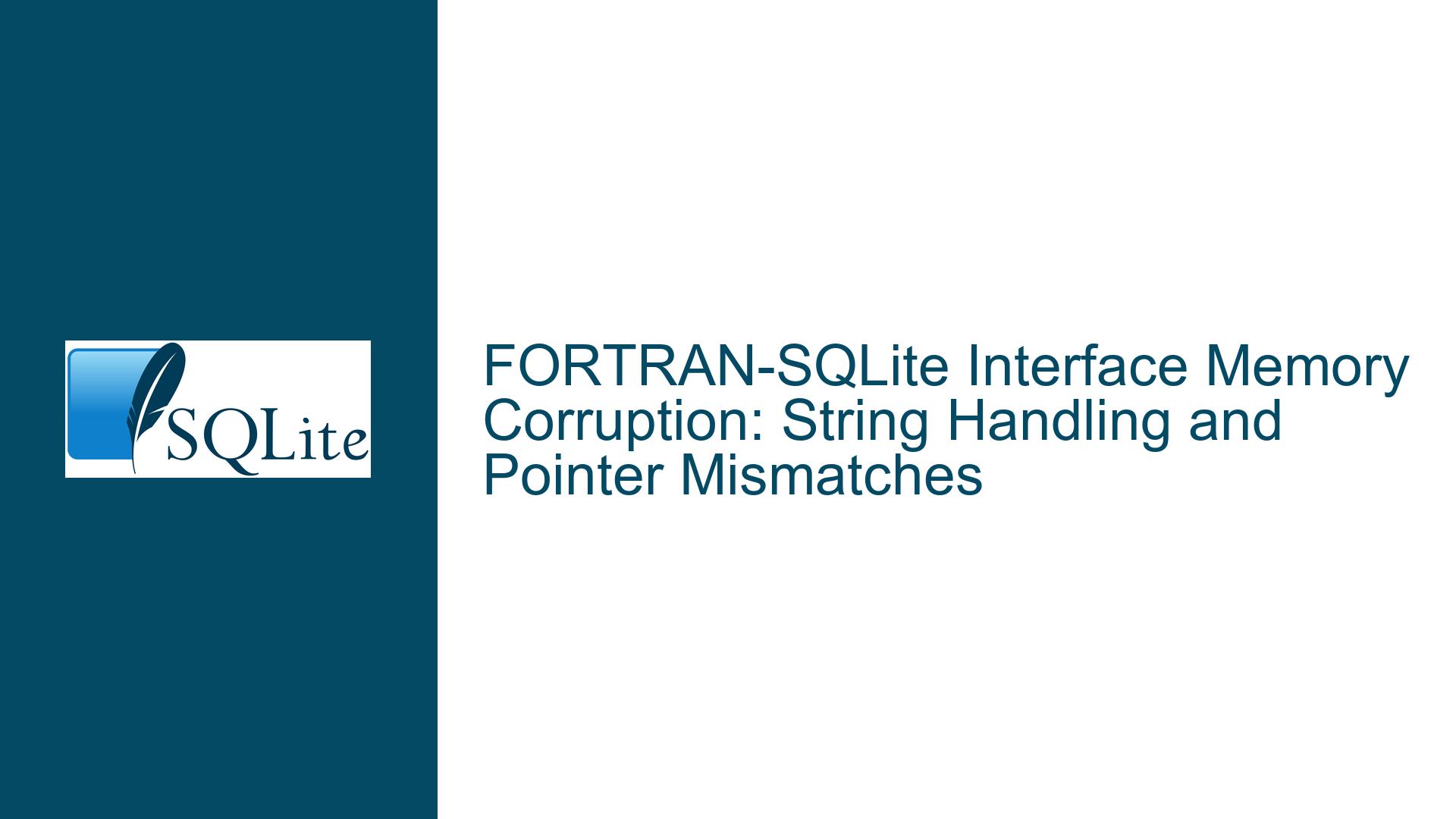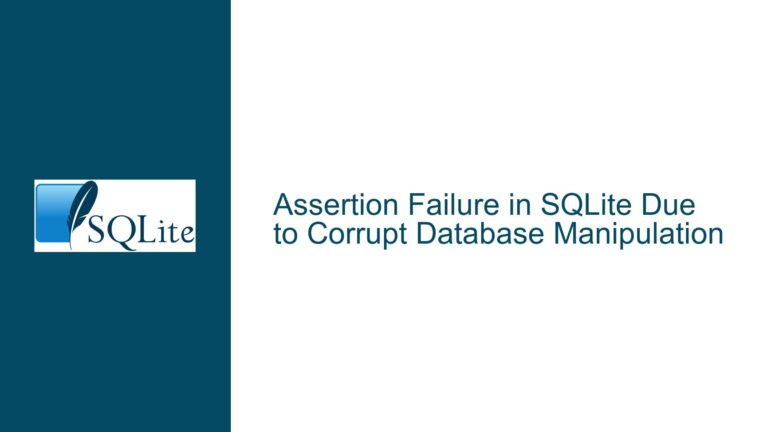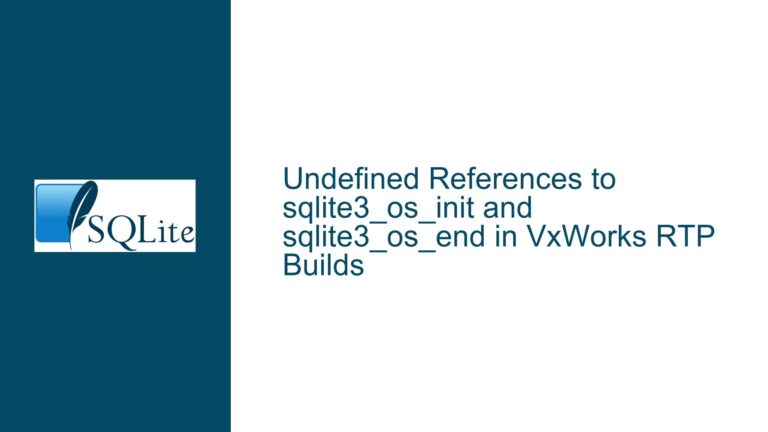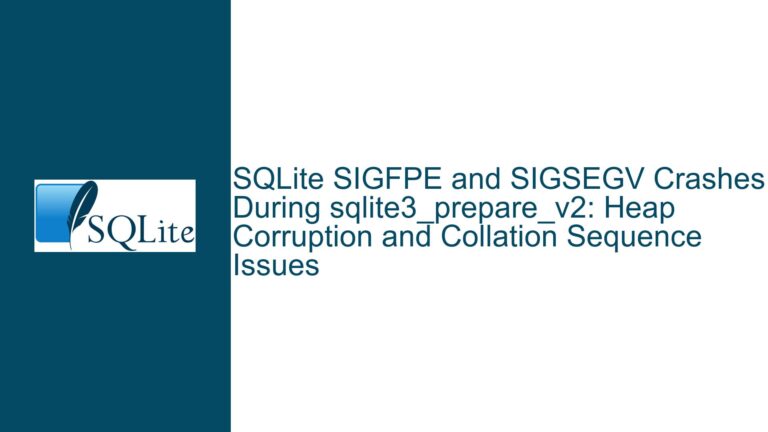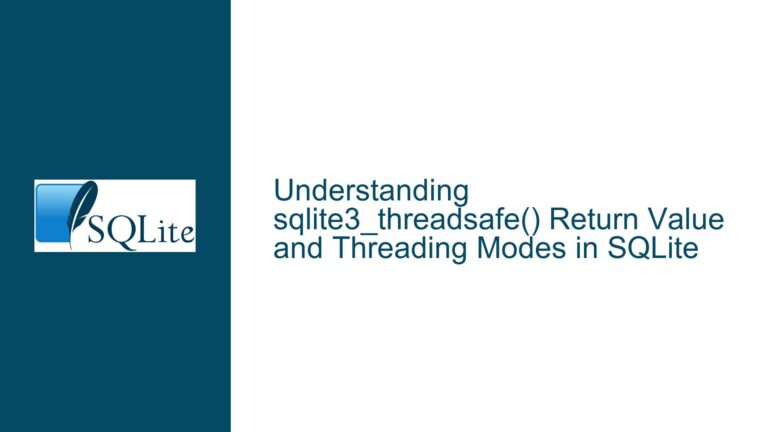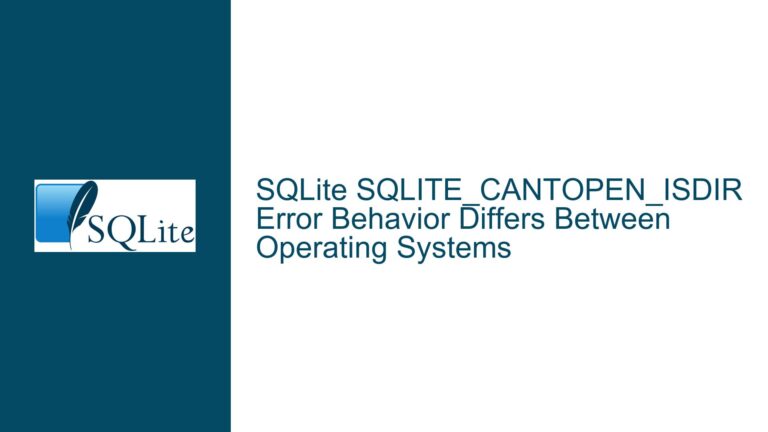FORTRAN-SQLite Interface Memory Corruption: String Handling and Pointer Mismatches
Issue Overview: Memory Corruption During Database Handle Acquisition in FORTRAN-C-SQLite Interface
The core problem involves memory corruption manifested as an array bounds write error when a legacy FORTRAN codebase interfaces with SQLite via a C wrapper function. The corruption occurs during database handle acquisition through the open_database_ C function called from FORTRAN. Key technical elements include:
Memory Corruption Signature
The debug tool reports writing 8 bytes to heap address0x3ccaf68a, exceeding the allocated 128-byte block at0x3ccaf610by 122 bytes. This indicates a buffer overflow where 8 bytes are written 2 bytes beyond legal allocation boundaries. The stack trace implicates SQLite’s memory allocation chain (sqlite3Malloc→sqlite3DbMallocZero) during schema initialization (sqlite3SchemaGet), triggered bysqlite3_open.FORTRAN-C Interop Mechanics
- FORTRAN passes fixed-length
CHARACTER*512strings without null termination - Implicit string length argument (
f_len) appended to C function calls - Use of
integer*8(64-bit integer) to represent C pointers (sqlite3**) - Pointer assignment via
*fortran_handle = dbin C code
- FORTRAN passes fixed-length
Critical Code Patterns
- String Conversion: The
fsallocfunction converts FORTRAN strings to C strings - Pointer Lifetime: Database handle (
sqlite3*) stored in FORTRAN-managed memory - Memory Management: Absence of
free()for temporary filename buffer
- String Conversion: The
The corruption arises from two primary failure domains: improper string handling between FORTRAN and C causing buffer overflows, and pointer management errors in cross-language type representation. These interact with SQLite’s internal memory allocation patterns to produce the observed heap violation.
Possible Causes: String Termination Failures and Pointer Representation Mismatches
1. FORTRAN-to-C String Conversion Without Proper Null Termination
FORTRAN CHARACTER arrays lack implicit null terminators. When passing dbName (512-byte buffer) to C, the wrapper must:
- Allocate
f_len + 1bytes (wheref_lenis actual string length ≤512) - Copy
f_lenbytes from FORTRAN buffer - Explicitly add
\0terminator at indexf_len
Failure Modes:
- Buffer Under-Allocation: If
fsallocallocates onlyf_lenbytes instead off_len+1, writing the terminator overflows the buffer - Terminator Omission: If
fsalloccopies all 512 bytes (including padding) without trimming to actual length, SQLite interprets garbage bytes after FORTRAN string content as part of the filename
Example Corruption Pathway:
- FORTRAN passes 122-character filename (no null terminator)
fsallocallocates 122 bytes, copies 122 chars- Missing terminator causes
sqlite3_opento read past buffer end - Heap metadata corruption occurs during subsequent SQLite operations
2. Pointer Type Mismatch in FORTRAN/C Handle Representation
FORTRAN’s integer*8 dbHandle stores the sqlite3* pointer value as a 64-bit integer. The C wrapper interprets this as sqlite3** fortran_handle (pointer-to-pointer). The assignment *fortran_handle = db writes the 8-byte sqlite3* value to memory pointed by fortran_handle.
Failure Modes:
- Invalid Pointer Casting: If FORTRAN’s
dbHandleisn’t properly aligned or initialized as pointer storage - Pointer Size Mismatch: On 32-bit systems where
integer*8exceeds native pointer size (not applicable here given error context) - Dereference Violation: If
fortran_handlepoints to memory not allocated for pointer storage
Example Corruption Pathway:
- FORTRAN declares
dbHandleas uninitializedinteger*8 - C code treats
fortran_handleas validsqlite3**pointer *fortran_handle = dbwrites 8 bytes to arbitrary memory location- Heap corruption occurs when SQLite later allocates near this address
3. Memory Leak in Temporary Filename Buffer
The t_filename buffer allocated by fsalloc isn’t freed after sqlite3_open, causing memory leaks. While not directly causing the array bounds write, this indicates broader resource management issues that may compound memory corruption under heavy usage.
Troubleshooting Steps, Solutions & Fixes
1. Diagnose and Fix FORTRAN-to-C String Conversion
Step 1: Audit fsalloc Implementation
Obtain the implementation of fsalloc to verify:
- Allocation size is
f_len + 1 - Explicit null termination at
t_filename[f_len] - Handling of FORTRAN’s blank-padded fixed-length strings
Common Bug Patterns:
// WRONG: Copies entire FORTRAN buffer including padding
char* fsalloc(char* f_str, int f_len) {
char* c_str = malloc(f_len);
memcpy(c_str, f_str, f_len);
return c_str; // No null terminator
}
// CORRECT: Trim trailing spaces and null-terminate
char* fsalloc(char* f_str, int f_len) {
// Trim trailing spaces
while (f_len > 0 && f_str[f_len-1] == ' ') f_len--;
// Allocate with terminator
char* c_str = malloc(f_len + 1);
memcpy(c_str, f_str, f_len);
c_str[f_len] = '\0';
return c_str;
}
Step 2: Add Boundary Checks
Insert debug prints or assertions in open_database_:
t_filename = fsalloc(filename, f_len);
assert(t_filename[strnlen(t_filename, f_len+1)] == '\0'); // Validate termination
Step 3: Use SQLite Tracing
Enable SQLite’s file open logging to verify filename integrity:
sqlite3_open_v2(t_filename, &db, SQLITE_OPEN_READWRITE, NULL);
printf("Attempting to open: [%s]\n", t_filename); // Inspect actual filename
2. Validate FORTRAN/C Pointer Handling
Step 1: Ensure Proper Pointer Storage
FORTRAN must reserve memory for pointer storage before C writes to it:
FORTRAN:
integer*8 dbHandle
! Explicitly initialize as null pointer
dbHandle = 0
character*512 dbName
return_value = open_database(dbName, dbHandle)
C:
int open_database_(char* filename, sqlite3** fortran_handle, FsLen f_len) {
// ...
// Ensure fortran_handle points to writable memory
if (fortran_handle == NULL) return SQLITE_MISUSE;
*fortran_handle = db;
return rc;
}
Step 2: Use Interoperability Types
Modern FORTRAN supports C interoperability:
use, intrinsic :: iso_c_binding
type(c_ptr) :: dbHandle
character(512) :: dbName
interface
function open_database(filename, db) bind(c, name="open_database")
import :: c_ptr, c_char, c_int
character(kind=c_char) :: filename(*)
type(c_ptr) :: db
integer(c_int) :: open_database
end function
end interface
Step 3: Pointer Marshaling Verification
Inspect pointer values across language boundary:
C:
printf("C: db handle = %p\n", db);
printf("C: fortran_handle storage at %p\n", fortran_handle);
FORTRAN:
! After call
print *, 'FORTRAN: dbHandle = ', dbHandle
Compare addresses to ensure proper pointer storage.
3. Comprehensive Memory Management
Solution 1: Fix fsalloc Memory Leak
Free temporary filename buffer after sqlite3_open:
t_filename = fsalloc(filename, f_len);
rc = sqlite3_open(t_filename, &db);
free(t_filename); // Critical cleanup
Solution 2: Use SQLite Memory Management
Replace fsalloc with SQLite’s allocator for better diagnostics:
t_filename = sqlite3_malloc(f_len + 1);
// ... copy and terminate ...
rc = sqlite3_open(t_filename, &db);
sqlite3_free(t_filename);
Solution 3: Add Error Handling
Properly propagate error codes and validate handles:
int open_database_(...) {
if (t_filename == NULL) return SQLITE_NOMEM;
rc = sqlite3_open(t_filename, &db);
if (rc != SQLITE_OK) {
sqlite3_close(db);
db = NULL;
}
*fortran_handle = db;
free(t_filename);
return rc;
}
4. Advanced Debugging Techniques
Technique 1: Memory Sanitizers
Compile SQLite and C wrapper with address sanitizer:
CFLAGS="-fsanitize=address" LDFLAGS="-fsanitize=address" ./configure
Technique 2: SQLite Debug Logs
Enable internal logging before sqlite3_open:
sqlite3_config(SQLITE_CONFIG_LOG, debug_log_callback, NULL);
Technique 3: FORTRAN Array Bounds Checking
Compile FORTRAN with array bounds checking:
gfortran -fcheck=all -o app *.f90
Final Corrected Implementation
C Wrapper:
#include <sqlite3.h>
#include <string.h>
int open_database_(char* filename, sqlite3** fortran_handle, int f_len) {
sqlite3* db = NULL;
char* t_filename = NULL;
int rc = SQLITE_ERROR;
// Validate input pointers
if (!fortran_handle || !filename) return SQLITE_MISUSE;
// Convert FORTRAN string to C string
t_filename = sqlite3_malloc(f_len + 1);
if (!t_filename) return SQLITE_NOMEM;
memcpy(t_filename, filename, f_len);
t_filename[f_len] = '\0'; // Explicit termination
// Trim trailing spaces
while (f_len > 0 && t_filename[f_len-1] == ' ') {
t_filename[--f_len] = '\0';
}
rc = sqlite3_open(t_filename, &db);
sqlite3_free(t_filename);
if (rc != SQLITE_OK) {
sqlite3_close(db);
*fortran_handle = NULL;
} else {
*fortran_handle = db;
}
return rc;
}
FORTRAN Caller:
program main
use, intrinsic :: iso_c_binding
implicit none
type(c_ptr) :: dbHandle
character(512) :: dbName
integer(c_int) :: rc
dbName = 'test.db' // C_NULL_CHAR
rc = open_database(dbName, dbHandle)
if (rc == 0) then
print *, 'Database opened successfully'
else
print *, 'Error opening database: ', rc
end if
end program
This implementation addresses all identified failure modes: proper string handling with null termination, correct pointer management, and rigorous memory cleanup. The use of SQLite’s allocator ensures compatibility with its internal memory tracking systems, while explicit error checking prevents invalid handle propagation.
